Bashar Aldyab read the first three words of the email, "We are pleased … ," and threw his phone. The Syrian refugee living in Jordan did not speak English well enough to know the nuances of the word "please" and assumed the letter from the World University Service of Canada was yet another rejection. Since leaving Syria in 2013 during his fourth year of dentistry at Damascus University - prompted by two wrongful arrests and detentions - Aldyab had applied for three scholarships and was thrice turned down. By this point, he was so accustomed to misfortune that the possibility of anything else was impossible to imagine. Finally, after five minutes had passed, he read the full email: "We are pleased to offer you a sponsorship for the 2016-2017 academic year."
Aldyab had received the University of Alberta President's Award for Refugees and Displaced Persons. He was going to Canada.
"I've been here a year and I still can't believe it," says the 27-year-old science student on a fall afternoon, lounging in his HUB Mall apartment with a view of the food court.
His roommate Ahmad Al-Hariri nods in agreement. He also got the full scholarship, which, along with the World University Service of Canada's resettlement program, gives them permanent residency and puts them on a path to citizenship in as few as four years. "It was too good to be true," he says. "We do believe we did something good in our life, maybe helping other people, so God rewarded us." After a brutal war uprooted their lives, halted their educations, killed relatives and dispersed their families across Asia and Europe, it's not surprising that any good fortune might seem like an act of God.
The Syrian conflict, which started during the 2011 Arab Spring with protests against an oppressive regime that has ruled now for 46 years, has become a proxy war for various militias and nations, including Russia, the United States, Saudi Arabia and Iran. To date almost half a million people have died and 12 million people have been displaced - comparable to the number of people who fled Germany during the Second World War.
The conflict hit the front page in Canada after the death of a three-year-old boy in September 2015. Alan Kurdi drowned after his family's raft capsized during an escape attempt to Greece. The image of his body washed up on a beach sparked outrage around the world. The U of A scholarship was created shortly after that incident and prompted nearly $8,700 in donations. "I believe Alan Kurdi is the reason we are here," says Abdullah Altamer, another recipient of the President's Award, who lived with Aldyab and Al-Hariri until moving into his own apartment downtown.
In total, 14 people have received the President's Award over the past two years, and these students are now starting to get a foothold in Canadian life. Years of turmoil crushed their plans for the future, but now their lives are developing again like a rediscovered roll of film.
Each image in this photo essay is a single frame in a single second of the last 10 months in the lives of three men who sought refuge in Canada. It captures them as they create support networks, seek new friends of similar interests, adjust to new customs and rekindle their interrupted ambitions. It also captures them learning to live independently for the first time - as when they try to replicate family recipes with the long-distance guidance of their mothers, who are still in Jordan.
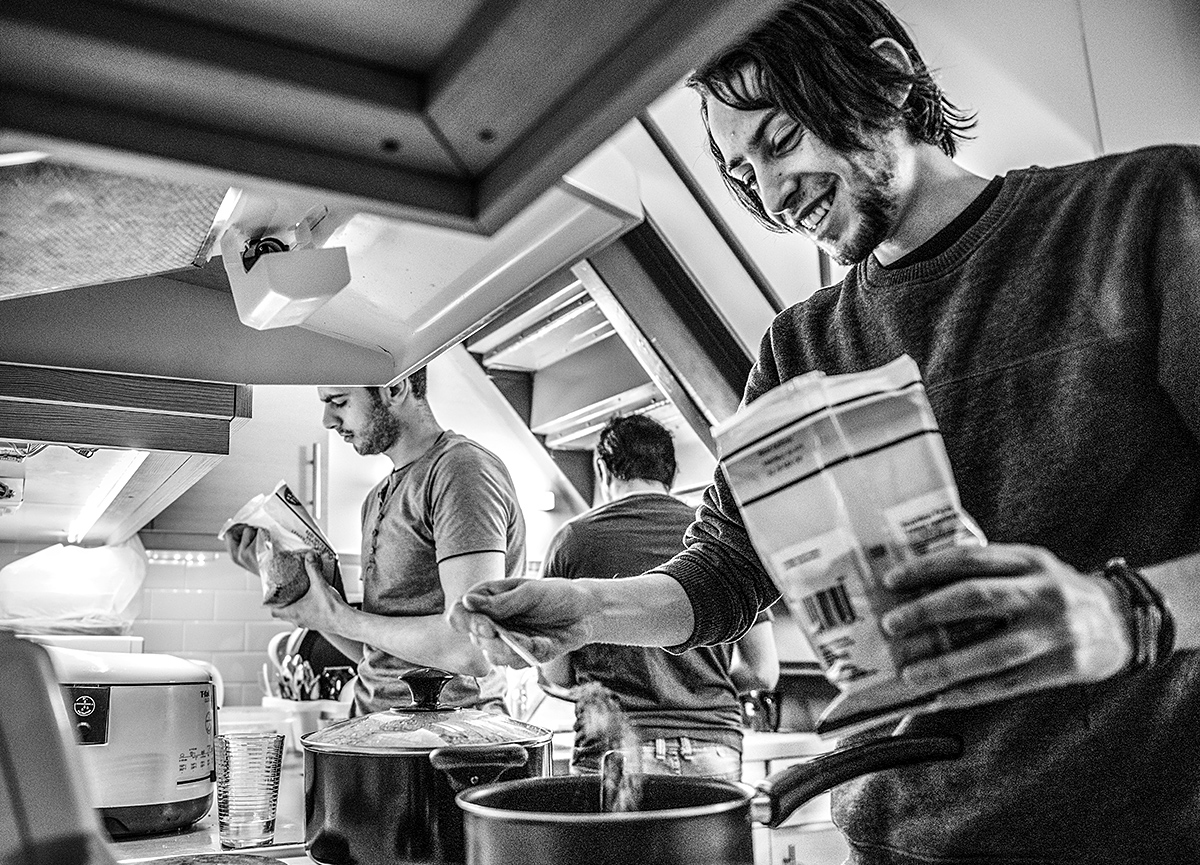
Photo Credit: John Ulan
The pictures show mundane tasks because that's what peace is. Peace is a calmness that creates space in the mind to imagine a future. It's the ability to walk through a green park, safely. To play an organized soccer game with friends and strangers, safely. To drive to the mountains or a farmers market, safely. (And without travel documents.) "This is all the freedom I want," says Altamer, now a second-year engineering student.
He describes his last years as living in two distinct prisons. In Syria, his liberties were inhibited by danger - where even walking to school could be deadly and some of his friends and family were killed or arrested. As a refugee in Jordan, his liberties were restricted by having to work 48 hours a week on top of his course load to be able to afford to study. Now, in Edmonton, he has regained leisure and stability but not without consequence. He can't stay home long without getting anxious, he says. The freedom outside is too intoxicating - even when the weather is frigid - and the four walls inside can drive his mind back to dark places.
This is what the camera can't capture: emotional subtleties like post-traumatic stress or survivor's guilt, an insidious consequence of freedom regained.
Not long after Aldyab witnessed the first crackdown on protesters, in 2011, police came for him and his cousin while they were sleeping; as males of battle age they were considered potential recruits for the rebels. He was rounded up with hundreds, possibly thousands of other men, he says, and beaten all the way to the detention centre. There, he was blindfolded, interrogated and burned with something hot enough to leave permanent scars. The cell was crowded with so many prisoners that men slept on their sides in a position they called "the sword."
"When your family is killed, when your people are killed, you should have to do something."
-Bashar Aldyab
"I was expecting death at any time," he says.
Aldyab was released 27 days later and 26 pounds lighter. He stumbled through the streets in an altered state, frightening passersby, until a pitying taxi driver took him home.
That he recovered enough to return to university in Syria is astonishing. Nobody would have blamed him for taking off then or, like his cousin, joining the rebellion and dying in combat. Aldyab survived a second arrest, too. Yet, as a second-year U of A student planning for a career in dental hygiene, he says he feels like a coward.
"I don't like fighting, but when your family is killed, when your people are killed, you should have to do something. But this is what I do now. I can take my revenge by helping bring Syrian people to get an education." He recently helped two friends apply successfully for World University Service of Canada scholarships.
Getting here, though, is just the beginning. Adaptation is a slow process. Take something as simple as offering a cup of coffee to a friend: Canadians will either accept or decline. But in Middle Eastern countries, the friend is expected to decline - even if they want the coffee - and only accept it after repeated insistence. (Persians call this taarof and it confuses even the savviest travellers.) The overnight change to rules of society such as these young people have experienced can result in unintentional offences for both parties, though there are fewer every day for the three friends. "I love the Canadian way," says Al-Hariri, "that when you say 'Yes' you mean yes and when you say 'No' you mean no."
They're also beginning to understand the many degrees of "please" and become fluent in Canada's particular brand of politeness. This, too, takes adjusting. "Sometimes they make me feel like I'm a bad person," says Aldyab. "It's always 'sorry this, please that.' " What seems like a courtesy to most of us could feel like an overwhelming pressure to be perfect, he says.
"But you know," adds Al-Hariri, "we're starting to hold doors now and say sorry for everything, too."
Photo Essay: Building a New Life
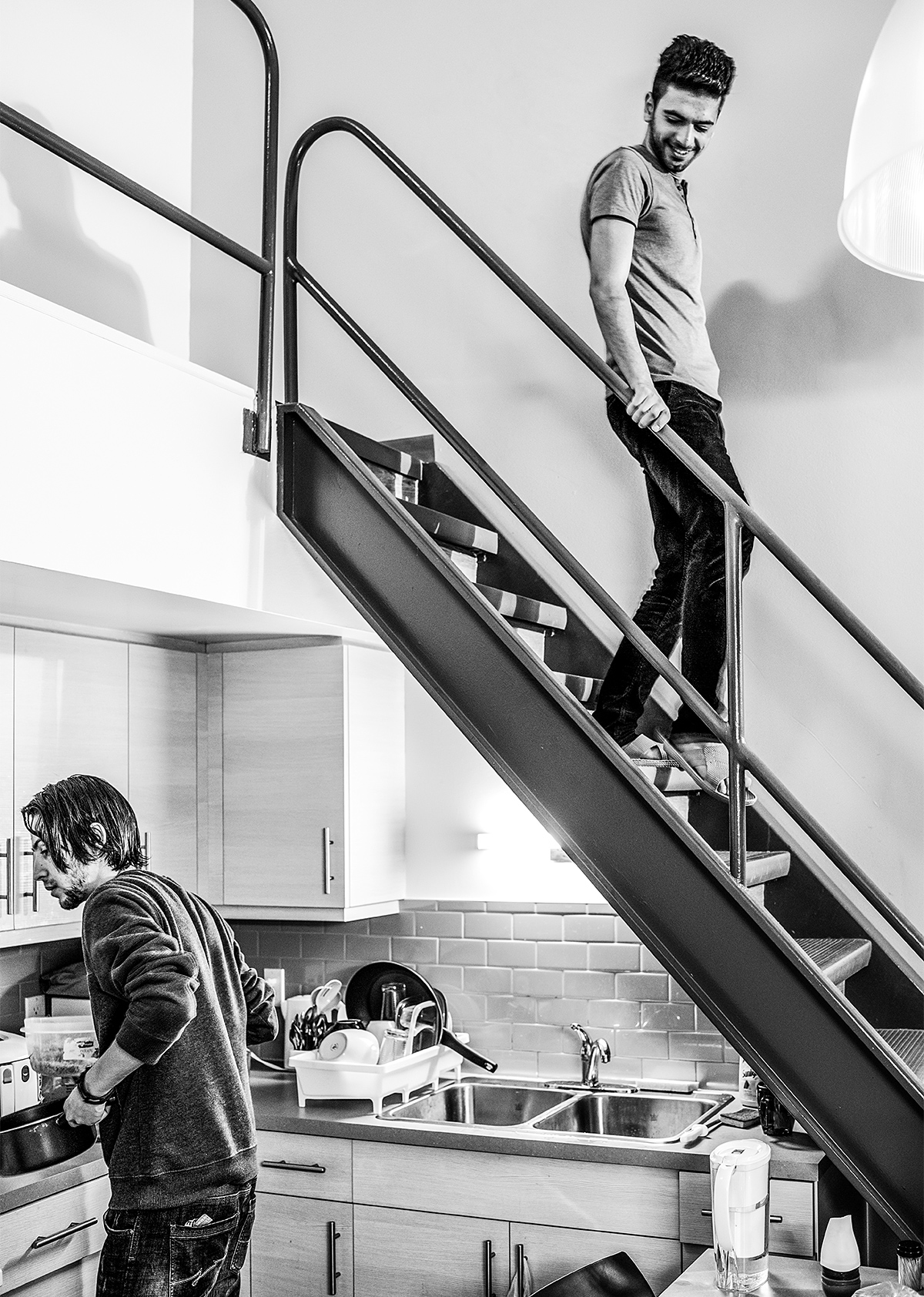
Cooking with Friends
Though they come from a region with a rich culinary culture, cooking isn't natural for these men. As this is their first time living without their mothers, it's also their first time making their own meals, a lesson all the more necessary since restaurant prices are five times what they're used to. Ahmad Al-Hariri, having worked as a prep cook in Jordan, is more skilled but he still relies on YouTube videos and messaging his mom for recipes. Together the young men have learned to make thick lentil soup, a spicy chicken and rice dish called kabsa, and fattet, a hummus and pita-bread pudding. They leave Friends on the television in the background; it's like having free English-language lessons. (From left: Ahmad Al-Hariri and Bashar Aldyab)
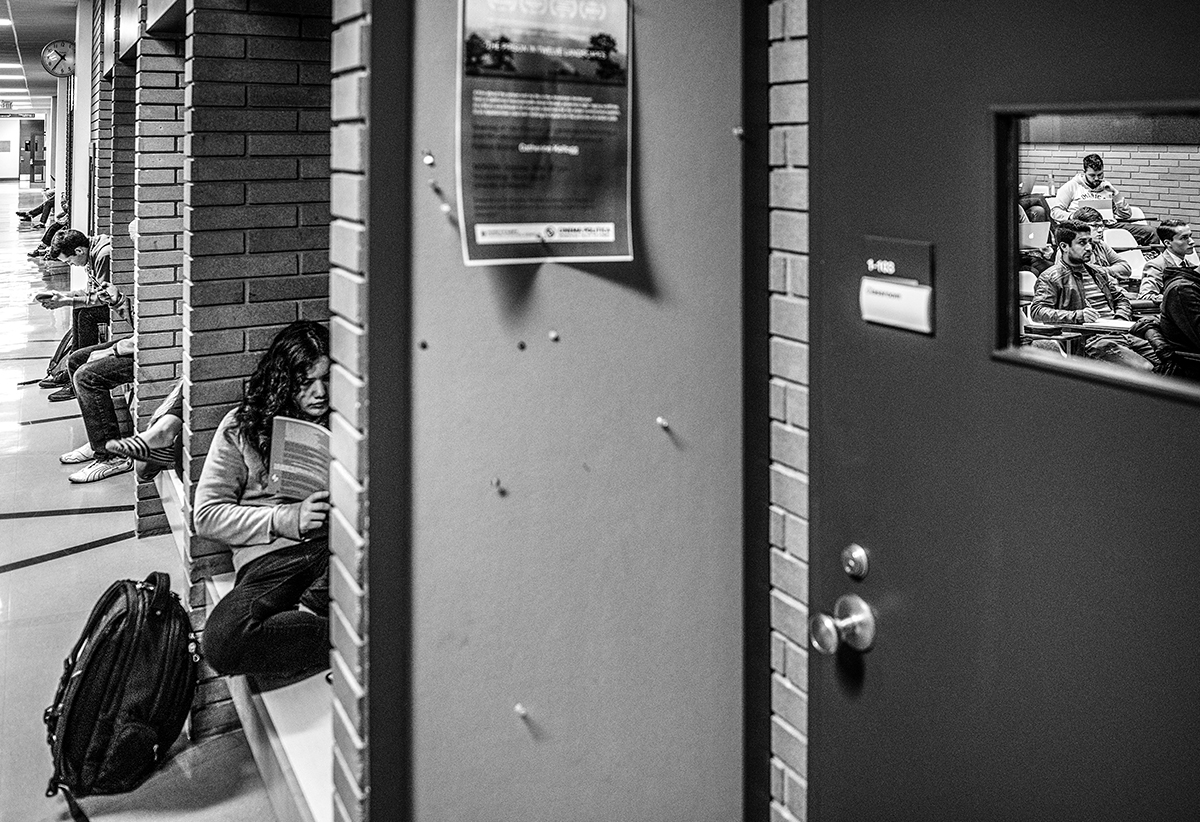
A Student's Life
Before the civil war in Syria, the recipients of the President's Award were living purposeful lives with the means and ambition to obtain university degrees. For them, their lives are less about starting over than about picking up and moving forward in a safe place. "I think that I'm now settled down and have no trouble," says Abdullah Altamer (above, in a class). "The only trouble I have is studying trouble."
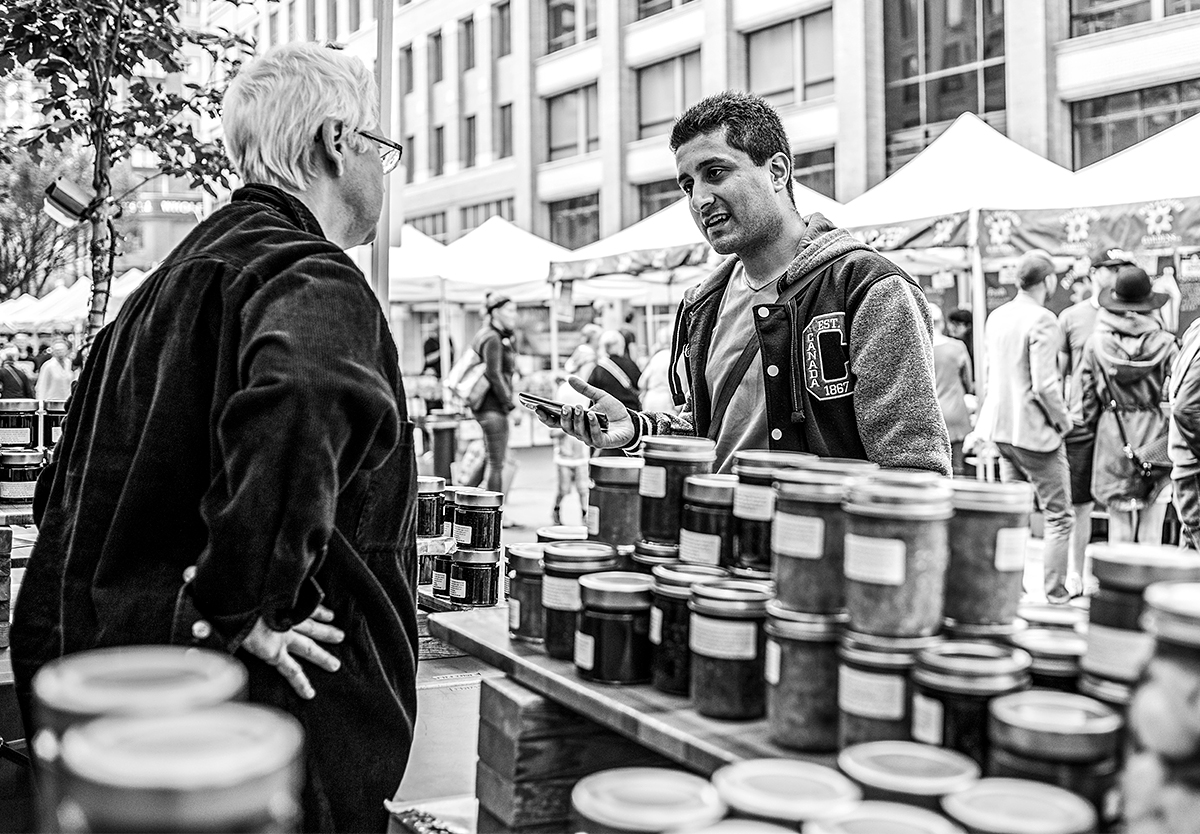
Open Air
Abdullah Altamer shops for artisanal jam at an Edmonton farmers market. At home in Syria, civil war made simply leaving the house a risky endeavour. Two of his friends were killed - one by a rocket, another by kidnappers - and two cousins were arrested five years ago and never heard from again. Canada has returned peace to the students' lives, but it has also introduced an unfamiliar loneliness that comes with individualism. Canadians, to the Syrian friends, don't drop by the house or call to hang out unexpectedly. Altamer says he's often the one who takes the initiative. "And if no one responds, I will go by myself. I can't stay at home all day. It makes me nervous."
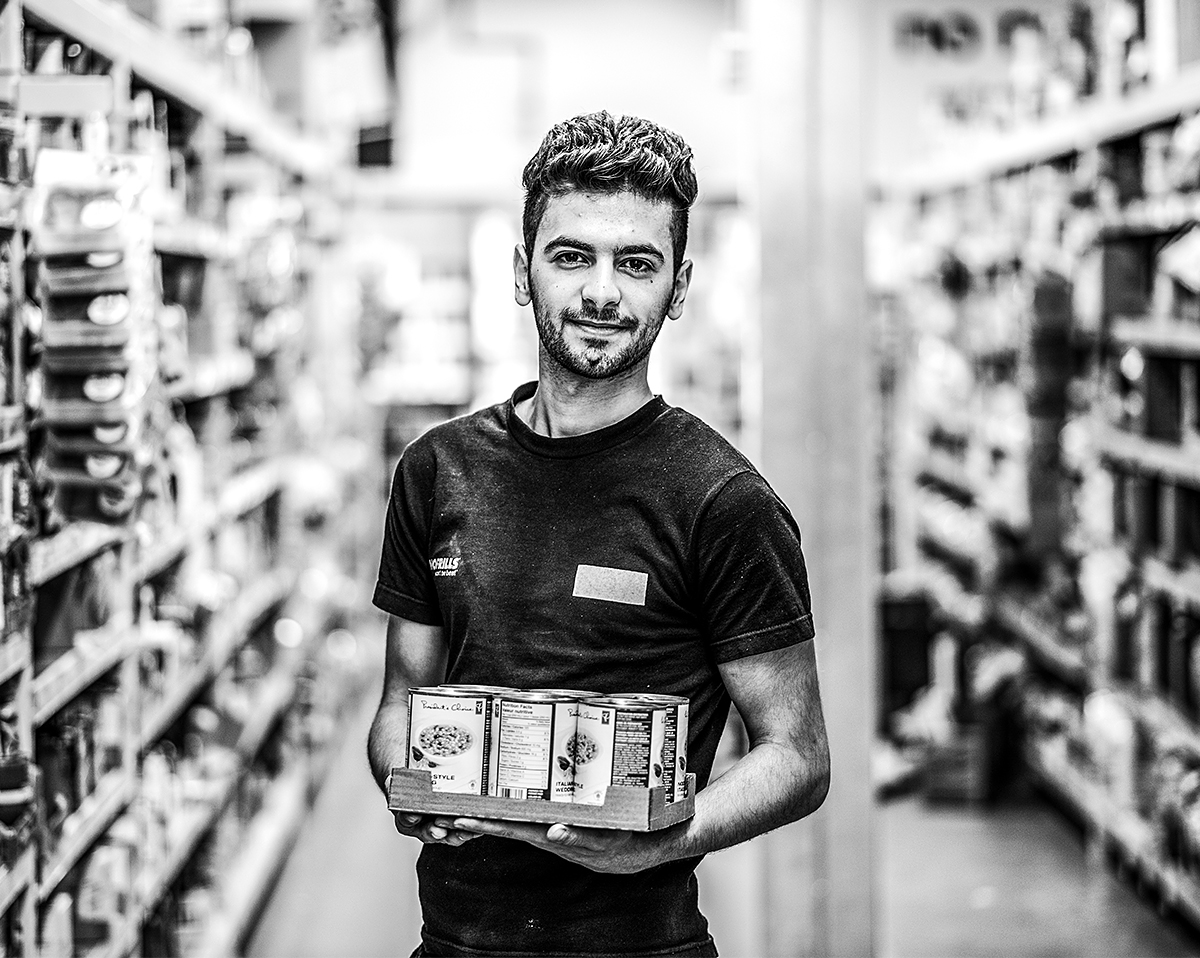
On the Job
A stock clerk job at No Frills has done more than provide supplemental income for Ahmad Al-Hariri. It has allowed him to make friends and build a community. In Jordan, where he lived as a refugee before coming to Canada, there is a massive class division between the growing Syrian refugee population and Jordanian nationals. As in other areas where the population feels overwhelmed by migrants, workplace exploitation is rampant, say the students. Bashar Aldyab recalls an employer in Amman, Jordan, denying him a chair during 12-hour shifts as a receptionist. And whereas his Jordanian colleagues were paid monthly, he was paid every two or three months. "They told me if I took one day off, they'd replace me. They enslaved us," says Aldyab, who has found meaningful work in Edmonton as a translator and university soccer referee.
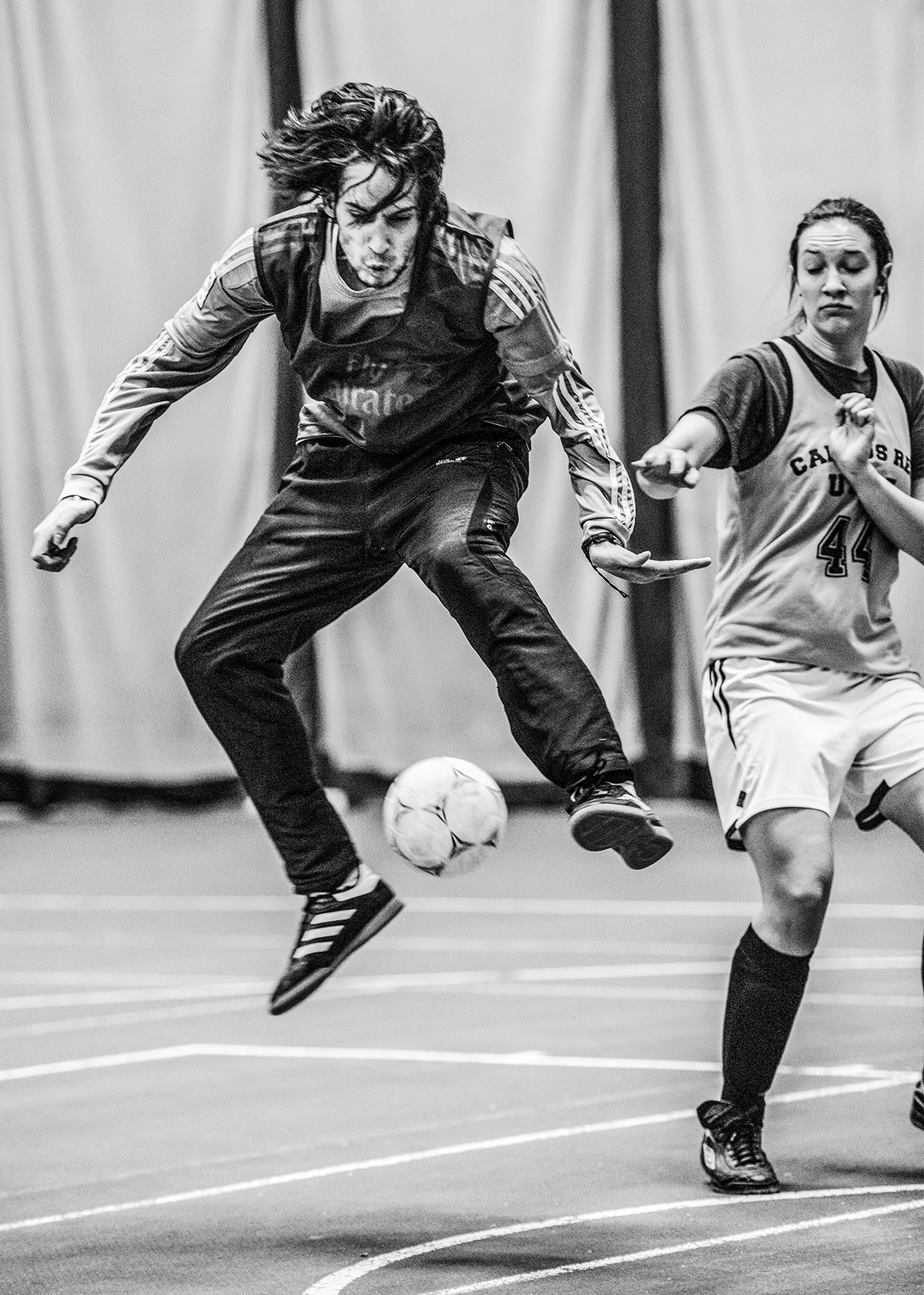
The Beautiful Game
Recreational soccer at the Butterdome is a fulfilling activity for Bashar Aldyab, who played regularly with friends in Damascus until the civil war made it unsafe. But there have been some adjustments in Canada. The teams are unisex, for one. But it's the non-competitive spirit that frustrates him, like seeing a player apologize to a goalie for scoring on him. "They tell me, 'Hey, relax man, we came just for fun,'" he says. "I'm like, 'Guys, no, we have to win!'" One memory he cherishes is an informal game during the World Indigenous Nations Games near Edmonton last summer. An Enoch Cree Nation player told him: "This is our land and we welcome you. If any Canadian tells you to go back home, just tell them it's not their land."
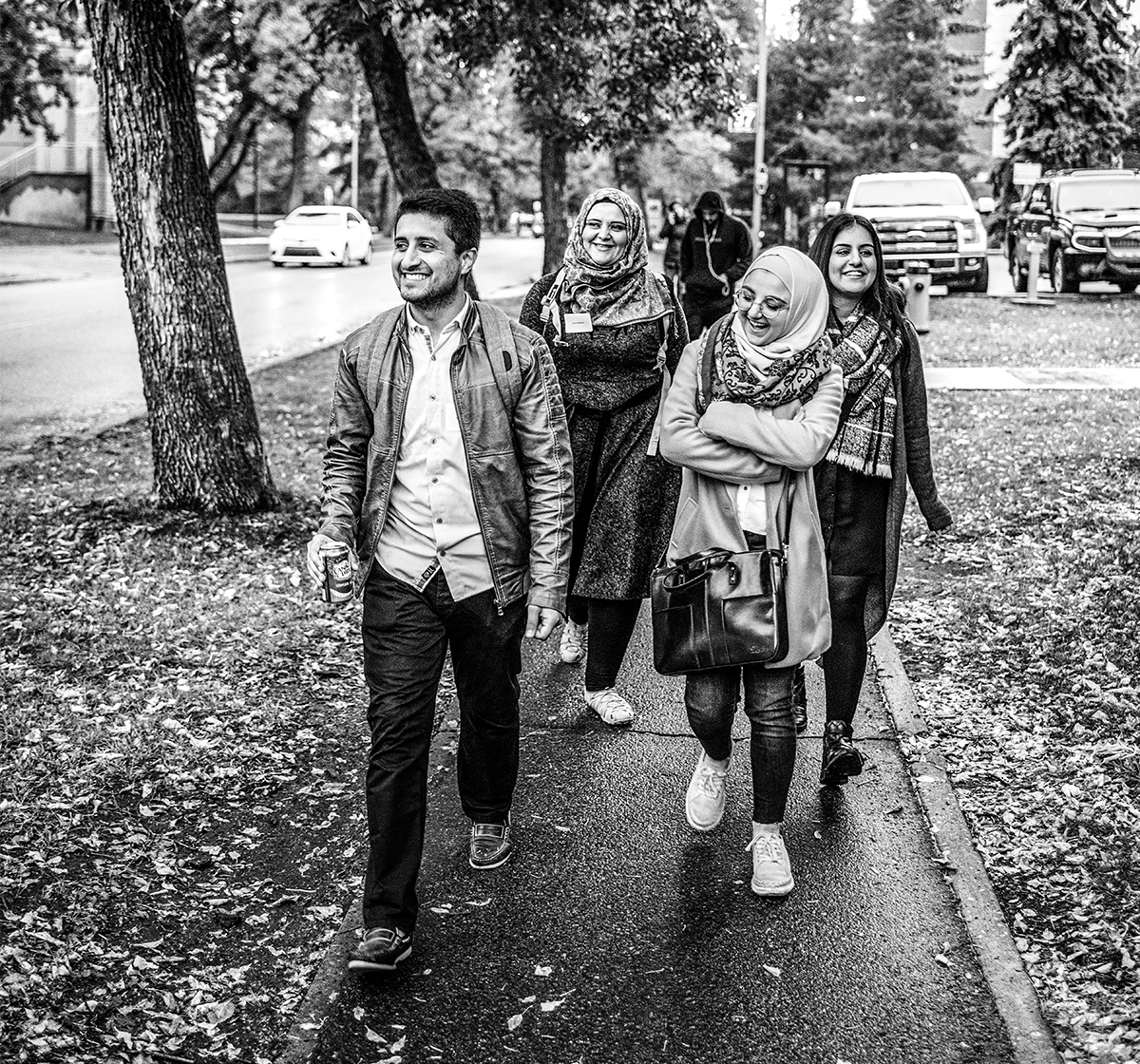
A Walk With Friends
Abdullah Altamer (right) and other Syrian students volunteered in September to welcome five more recipients of the President's Award for Refugees and Displaced Persons. They're happy to extend the same hospitality they were shown. "When I got off the plane, I found people holding signs, 'Welcome Abdullah to Canada,'" Altamer says. The student volunteers helped him get his U-Pass card, apply for engineering, connect him with his advisers. "And then they invited me into their homes for Thanksgiving." Bashar Aldyab adds, "We must have done something really good in life to deserve this, so that gave us the motivation to help people again."
Comment Policy
All views, respectfully presented, are welcome. Robust debate and criticism are encouraged provided it is civil. Thought Box reserves the right to reject comments, images or links that include offensive language; threats; spam; attack ethnicity, nationality, religion, gender or sexual orientation; are fraudulent or defamatory; infringe on copyright or trademarks; and those that just generally aren't very nice. Discussion is monitored and violation of these guidelines will result in comments being disabled.

We at New Trail welcome your comments. Robust debate and criticism are encouraged, provided it is respectful. We reserve the right to reject comments, images or links that attack ethnicity, nationality, religion, gender or sexual orientation; that include offensive language, threats, spam; are fraudulent or defamatory; infringe on copyright or trademarks; and that just generally aren’t very nice. Discussion is monitored and violation of these guidelines will result in comments being disabled.